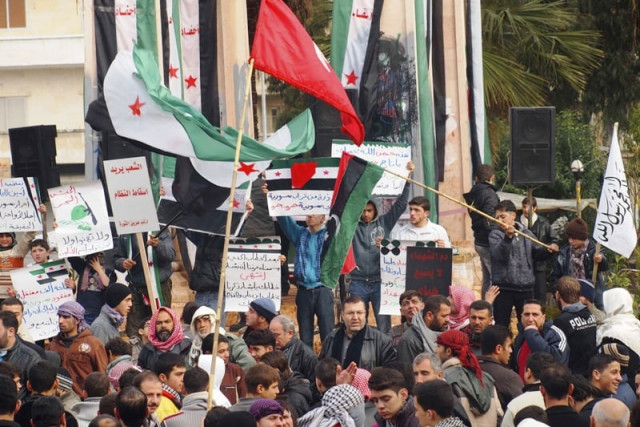Ceasefire to end Syria bloodshed appears to hold
A 'few explosions' were heard in the town of Zabadani shortly after the ceasefire entered into effect.

Ceasefire to end Syria bloodshed appears to hold
After breaking a commitment to pull back forces from population centres by Tuesday under the agreement brokered by former UN chief Kofi Annan, there were still no signs of a withdrawal, monitors said.
"An hour after the ultimatum expired, the situation is calm in all regions," said Rami Abdel Rahman of the Britain-based Syrian Observatory for Human Rights.
A "few explosions" were heard in the town of Zabadani, just outside the capital, shortly after the ceasefire entered into effect, Abdel Rahman told AFP in Beirut.
"There has not been any movement indicating a withdrawal of tanks," he added.
The report could not be verified due to the Damascus government's curbs on media.
Just hours before the deadline expired at 6:00 am (0300 GMT), the military unleashed a lethal offensive against protest centres, killing 25 civilians on Wednesday, including 10 in the rebel stronghold of Rastan, said the Observatory.
That was the same day that Annan, serving as a peace envoy for the UN and the Arab League, said he received a letter from Syria promising to "cease all military fighting throughout Syrian territory as of 6:00 am."
But the letter reserved the right "to respond proportionately to any attacks carried out by armed terrorist groups," a phrase President Bashar al-Assad's government uses to describe opposition forces.
US President Barack Obama and German Chancellor Angela Merkel agreed in a telephone call that the UN Security Council, which gave its blessing to Annan's plan, needed to "take more resolute action" on Syria.
"The president and chancellor shared the concern that the Assad government was not complying with the terms of the agreement negotiated by Kofi Annan and continued to engage in unacceptable brutality against its own people," the White House said.
The United Nations estimates more than 9,000 people have been killed since March 2011 as Assad's forces crush the latest in a series of uprisings against authoritarian leaders in the Arab world.
UN and US officials have charged that Assad may have carried out crimes against humanity.
Susan Rice, the US envoy to the United Nations, said Assad's regime has in fact intensified violence since it first committed to Annan's six-point plan on April 1.
"Its commitments therefore have little, if any, credibility ... given that track record," Rice said.
Annan's plan calls for the withdrawal of forces from urban areas, a halt to fighting, a daily two-hour humanitarian truce, the release of arbitrarily detained people, freedom of movement for journalists and the right to demonstrate.
The opposition Syrian National Council said both it and the rebel Free Syrian Army, a ragtag force of mainly army defectors, were committed to the truce but also voiced doubts about the regime's commitment.
"The Syrian people together with the international community will be watching carefully and monitoring the regime's deeds on the ground," said the Council's foreign relations chief Bassma Kodmani.
Ahead of the ceasefire, foreign ministers of the Group of Eight major industrial powers met in Washington for talks on Syria and other global crises, with both Britain and France pressing for monitors to verify any eventual ceasefire.
French Foreign Minister Alain Juppe called for the Security Council to seek a "robust observers force" that would verify compliance and "could move freely" without interference from Assad's regime.
British Foreign Secretary William Hague warned his government would boost support for Syria's opposition and seek further sanctions if Assad does not comply with the ceasefire.
"Our pressure on the regime -- its campaign of murder, torture and oppression -- must be intensified if Kofi Annan has not succeeded," Hague told reporters after the first day of the two-day talks.
On Thursday, Annan is to brief the Security Council by video link from Geneva, in what diplomats said would be key to the world body's next steps.
Russia has historically been the top supporter of Assad, and Secretary of State Hillary Clinton had said she would press Russian Foreign Minister Sergei Lavrov over Syria during the Group of Eight talks.
Moscow, which along with China vetoed two Security Council resolutions that would have tightened the screws on Assad, has championed the Annan peace plan but also sought pressure against the Syrian opposition.
Western governments argue a ceasefire alone is not enough and that the Damascus regime must withdraw its troops from towns and cities.
"Just ending the attacks will not be enough to be in compliance," one Western diplomat told AFP.
"It would be totally inadequate if they don't withdraw from population centres but keep troops and heavy artillery in place."



















COMMENTS
Comments are moderated and generally will be posted if they are on-topic and not abusive.
For more information, please see our Comments FAQ